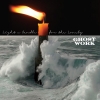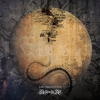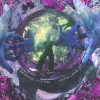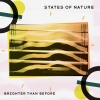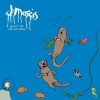Gig Reviews

Cult Leader
Stengade, Copenhagen, DEN - 15/4
Album Reviews
Thrice: A Retrospective
Previous Nextauthor DR date 08/12/11
Thrice will officially be on an 'indefinite hiatus' once their 2012 Spring tour has finished. Though frontman Dustin Kensrue insisted in his announcement post that 'Thrice is not breaking up', the future of the band is certainly up in the air. So, now seems as good a time as any to post a retrospective piece looking back on their career and their albums, what made them so special and why fans seemed to take to them so passionately.
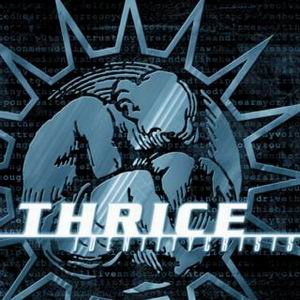 This kind of summation is probably going to be more use to those who have only had little-to-no interest in Thrice thus far, which almost means that their debut album, "Identity Crisis", probably isn't even worth mentioning. Drawing up a definitive ranking of their albums from best to worst is damn near impossible - they have evolved their sound too much, and as such polarise their fans - but their debut is the one album that most Thrice fans agree as their weakest. This isn't a slight on the album, though it is raw and underdeveloped and not for the better, it's more a measure of how far the band eventually progressed over the years. There was some promise to be found in the riffage of Teppei, or in a song like "Phoenix Ignition", but the title of "Identity Crisis" is rather apt, as, at that stage of their career, Thrice quite clearly hadn't quite figured themselves out yet.
This kind of summation is probably going to be more use to those who have only had little-to-no interest in Thrice thus far, which almost means that their debut album, "Identity Crisis", probably isn't even worth mentioning. Drawing up a definitive ranking of their albums from best to worst is damn near impossible - they have evolved their sound too much, and as such polarise their fans - but their debut is the one album that most Thrice fans agree as their weakest. This isn't a slight on the album, though it is raw and underdeveloped and not for the better, it's more a measure of how far the band eventually progressed over the years. There was some promise to be found in the riffage of Teppei, or in a song like "Phoenix Ignition", but the title of "Identity Crisis" is rather apt, as, at that stage of their career, Thrice quite clearly hadn't quite figured themselves out yet.
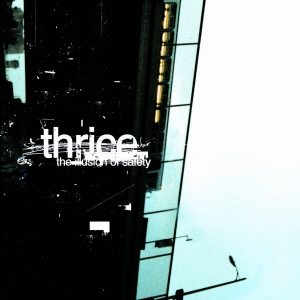 The transition from their debut to "The Illusion Of Safety" is the stuff musical legends are born out of. Though still raw, their sound was certainly no longer underdeveloped, and during the two years from the original release of "Identity Crisis", Thrice had suddenly gained focus on who they wanted to be and what they wanted to sound like. Overflowing with the vigour of punk and hardcore, superb metal-inspired guitar work, and not afraid to marry that with a catchy chorus, it's no wonder this was the album that they really built from. You only have to listen to "Deadbolt", which became, and remains, one of the most recognisable 'scene' songs of the decade, to be sold on the excellent guitar work, all-round tighter musicianship and the energy of Dustin's vocals. Back then 'scene' wasn't the diluted and meaningless word it is today - in 2002 the 'scene' was the likes of Thrice, Thursday and Glassjaw, three bands who helped define the genre for a new decade - and "The Illusion Of Safety" remains a testament to that, and everything great about what 'scene' once stood for.
The transition from their debut to "The Illusion Of Safety" is the stuff musical legends are born out of. Though still raw, their sound was certainly no longer underdeveloped, and during the two years from the original release of "Identity Crisis", Thrice had suddenly gained focus on who they wanted to be and what they wanted to sound like. Overflowing with the vigour of punk and hardcore, superb metal-inspired guitar work, and not afraid to marry that with a catchy chorus, it's no wonder this was the album that they really built from. You only have to listen to "Deadbolt", which became, and remains, one of the most recognisable 'scene' songs of the decade, to be sold on the excellent guitar work, all-round tighter musicianship and the energy of Dustin's vocals. Back then 'scene' wasn't the diluted and meaningless word it is today - in 2002 the 'scene' was the likes of Thrice, Thursday and Glassjaw, three bands who helped define the genre for a new decade - and "The Illusion Of Safety" remains a testament to that, and everything great about what 'scene' once stood for.
 After Thrice's "The Illusion Of Safety" and Thursday's "Full Collapse" had exploded in said scene, it wasn't just teenagers across North America that took note. In an odd run of parallels between the two bands, major label Island Records signed both, who subsequently released "Artist In The Ambulance" and "War All The Time" respectively, in the year 2003. "War All The Time" reached top 10 in the Billboard chart and "Artist In The Ambulance" reached top 20 - not bad for bands who probably started out only wanting to play local shows. What's noteworthy for Thrice, however, is that they were not only able to achieve mainstream success, but they were able to do so without 'selling out', or whatever that means. They maintained their metallic riffs, taste for experimenting with time signatures (for instance "Silhouette" moves from 2/2 to 7/8), and the lyrics showed considerable growth by delving into political/social issues. Okay, the production could have been better, but "The Artist In The Ambulance" remains one of Thrice's most popular albums, especially in terms of sales figures, and although I never grew up with it and therefore it doesn't have that nostalgia factor for me, it's not hard to hear why songs like "All That's Left" and "Stare At The Sun" 'broke' Thrice, and also why this album means so much to a lot of long-time Thrice fans.
After Thrice's "The Illusion Of Safety" and Thursday's "Full Collapse" had exploded in said scene, it wasn't just teenagers across North America that took note. In an odd run of parallels between the two bands, major label Island Records signed both, who subsequently released "Artist In The Ambulance" and "War All The Time" respectively, in the year 2003. "War All The Time" reached top 10 in the Billboard chart and "Artist In The Ambulance" reached top 20 - not bad for bands who probably started out only wanting to play local shows. What's noteworthy for Thrice, however, is that they were not only able to achieve mainstream success, but they were able to do so without 'selling out', or whatever that means. They maintained their metallic riffs, taste for experimenting with time signatures (for instance "Silhouette" moves from 2/2 to 7/8), and the lyrics showed considerable growth by delving into political/social issues. Okay, the production could have been better, but "The Artist In The Ambulance" remains one of Thrice's most popular albums, especially in terms of sales figures, and although I never grew up with it and therefore it doesn't have that nostalgia factor for me, it's not hard to hear why songs like "All That's Left" and "Stare At The Sun" 'broke' Thrice, and also why this album means so much to a lot of long-time Thrice fans.
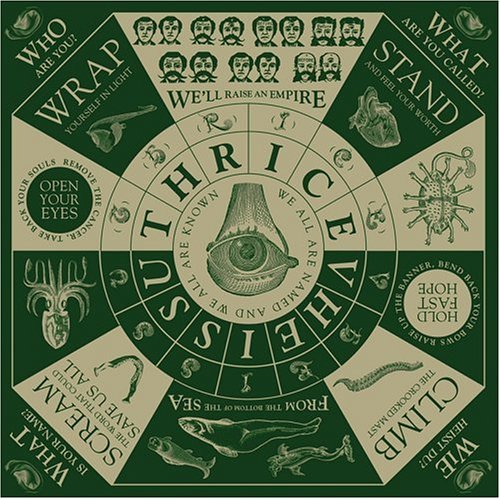 When bands sign to a major label, and their first release on that label pushes a lot of units, the production budget for the second album is probably going to be substantially greater. That's what happened with "Vheissu". Clearly, Thrice wanted to expand their sound immensely, so they brought in producer Steve Osborne [look at his production credits, look at how out of place Thrice are in that list!], and the result is a breath-taking departure from their punk beginnings. Seriously, you can't give the band enough credit for severing their roots completely and coming up with an experimental art rock masterpiece that draws from metal to weird Japanese sounds and everything in between.
When bands sign to a major label, and their first release on that label pushes a lot of units, the production budget for the second album is probably going to be substantially greater. That's what happened with "Vheissu". Clearly, Thrice wanted to expand their sound immensely, so they brought in producer Steve Osborne [look at his production credits, look at how out of place Thrice are in that list!], and the result is a breath-taking departure from their punk beginnings. Seriously, you can't give the band enough credit for severing their roots completely and coming up with an experimental art rock masterpiece that draws from metal to weird Japanese sounds and everything in between.
Just listen to "The Earth Will Shake"; between folk-y acoustics, gospel-y prison-yard chanting, and even blues-y guitar-work in the bridge, you're pummelled with Isis-inspired post-metal riffs. In theory, the result should be an utter mess of mismatched styles, but the result is simultaneously crushing, moving, and epic. From its grave piano opening, "For Miles" builds to an uplifting yet screamed crescendo, and though Dustin is singing of Christ's sacrifice, he does so with so much emotion and conviction that he never oversteps the mark into 'preachy', and actually never directly references Him, leaving it slightly open-ended for each listener's personal interpretation. It has become, arguably, the most definitive Thrice song to date.
Biblical references are there throughout "Vheissu" for those who know what to listen for, but he's never beating you over the head with his faith; they are surrounded by personal and philosophical lyrics crafted by the well-read and typically humble Dustin Kensrue. Even "Music Box", the worst song on the album, is ambitious in a way that many bands will never even dare to match. It's not completely perfect, but general opinion among long-time listeners is that "Vheissu" is Thrice's masterpiece, and who in their right mind would dare argue with that?
Well, lovers of "The Alchemy Index" might - with good reason, too. Created as four EPs, released as two double-albums, intended as one singular project; each disc of "The Alchemy Index" represents one of the four elements (fire, water, air, earth) and over the course of each disc attempts to recreate the feeling of that element and concludes with a final song that takes the perspective of that element in attempt to convey its relationship with man, in the lyrical form of a sonnet.
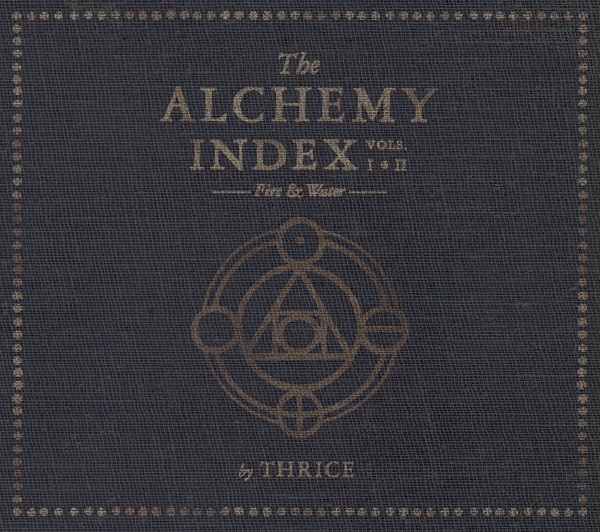 The first two volumes, "Fire & Water", are as a natural progression as any in Thrice's discography, with each delving deeper into polarising ends of "Vheissu". "Fire", naturally, is some of Thrice's most aggressive, bleak and boisterous work ever, while "Water" expands on the atmospheric tendencies of a song like "Atlantic". What shines about these works, though, is that not only are the discs simply bursting with great songs, but they truly capture the power of their respective elements. "The Arsonist" and "The Messenger" are relentless and furious, but there also more calculated efforts like "Backdraft" that are subdued yet tense in the verses, and unleashed in the scorching chorus that hits the listener as though experiencing an actual backdraft.
The first two volumes, "Fire & Water", are as a natural progression as any in Thrice's discography, with each delving deeper into polarising ends of "Vheissu". "Fire", naturally, is some of Thrice's most aggressive, bleak and boisterous work ever, while "Water" expands on the atmospheric tendencies of a song like "Atlantic". What shines about these works, though, is that not only are the discs simply bursting with great songs, but they truly capture the power of their respective elements. "The Arsonist" and "The Messenger" are relentless and furious, but there also more calculated efforts like "Backdraft" that are subdued yet tense in the verses, and unleashed in the scorching chorus that hits the listener as though experiencing an actual backdraft.
The "Water" disc, however, is simply phenomenal because submerging yourself into it is as close as you'll get to feeling the vastness of the ocean without actually being there. "Digital Sea" is worthy of words ranging from 'soundscape' to 'heavy' - despite being very electronic, while in comparing the ocean to God, Dustin finds himself quivering his delivery in the otherwise cinematic "Open Water", and it is utterly stunning. But the gem here is "Night Diving", an entirely instrumental track captures the sheer power of the ocean and that it can turn from serene to severe in a second, and they do this with reverb-y guitar tones to create an ambiguous yet epic atmosphere. Thrice's mastery over this element is encapsulated in disc closer "Kings Upon The Main": there's an SOS signal that opens, which slowly subsides as the splashing electronics give the impression of waves taking over, and through Dustin's cold, calculated and composed delivery, he takes on the character of the sea, almost mocking man's pride and futility when faced with his awesomeness. Is it ironic, then, that in near-perfectly re-creating the power and vastness of the sea, Thrice ultimately mastered what they deem unmasterable?
 The third and fourth volumes, "Air & Earth", were released some sixth months later. These two discs are the most experimental of the whole series, though some would argue only one disc for the better. That disc is "Air". Aside from "As The Crow Flies", possibly the weakest track throughout the entire Index, "Air" contains some of Dustin's, and therefore Thrice's, best work. Dustin's falsetto vocals in closer "Silver Wings" are nothing short of astonishingly good, and again at the end of "Broken Lungs", which deals with the confusion in the aftermath of 9/11 wonderfully and tactfully as he transitions from screamed to angelic falsetto vocals seamlessly whilst asking for the truth. With "Daedalus" Thrice penned one of their greatest ever songs, in which Dustin assumes the role of title-character and sings of losing his son so mournfully that it's as though he's singing of his own personal loss. However, while Dustin steals a lot of the praise for his performance, there's trademark attention to detail displayed by the band as a whole in telling the story, and therefore representing the emotions of the song. Throughout the first few verses, a similar chord progression and pattern of notes in the guitars are maintained, but just after Dustin delivers "Maybe I've spoken too soon...", there's a notable drop in tone, as though to imply this is where Icarus begins to fall and, as a result, Daedalus' world begins to get darker.
The third and fourth volumes, "Air & Earth", were released some sixth months later. These two discs are the most experimental of the whole series, though some would argue only one disc for the better. That disc is "Air". Aside from "As The Crow Flies", possibly the weakest track throughout the entire Index, "Air" contains some of Dustin's, and therefore Thrice's, best work. Dustin's falsetto vocals in closer "Silver Wings" are nothing short of astonishingly good, and again at the end of "Broken Lungs", which deals with the confusion in the aftermath of 9/11 wonderfully and tactfully as he transitions from screamed to angelic falsetto vocals seamlessly whilst asking for the truth. With "Daedalus" Thrice penned one of their greatest ever songs, in which Dustin assumes the role of title-character and sings of losing his son so mournfully that it's as though he's singing of his own personal loss. However, while Dustin steals a lot of the praise for his performance, there's trademark attention to detail displayed by the band as a whole in telling the story, and therefore representing the emotions of the song. Throughout the first few verses, a similar chord progression and pattern of notes in the guitars are maintained, but just after Dustin delivers "Maybe I've spoken too soon...", there's a notable drop in tone, as though to imply this is where Icarus begins to fall and, as a result, Daedalus' world begins to get darker.
If "Air" is decidedly the best disc, then, at the very least, "Earth" is the most questionable. Many critics at the time asserted that it had more in common with Dustin's solo work than that of previous Thrice, and it's completely true. Almost entirely acoustic, the country-sound they sought with it is a shocking deviation for even this quartet; even more shocking, though, is that it's actually great. "Moving Mountains" and "Digging My Own Grave" show Dustin's evolution as a song-writer, as he's able to assume the perspective of rather depressed characters, their cover of Frodus' "The Earth Isn't Humming" is Ed's grooviest bass-line yet, and the band that wrote "Kill Me Quickly" had absolutely no right to write a country/worship song as good as "Come All You Weary". By stretching themselves so far as to draw from these sounds, this was the disc that proved Thrice could do anything they set their collective minds to - they are simply that talented.
Signing off the project is "Child Of Dust". At the end, if you listen closely, you can hear dirt being dropped onto the microphone to resemble the idea of rekindling a relationship with earth, one which we all take for granted. That kind of attention to detail that Thrice took with "The Alchemy Index" is staggering. You could tell that it was one of those projects that must have been more frustrating than we will ever know, and even though the ambition slightly outweighs the execution, "The Alchemy Index" is worth every second it took to create. It showed us how huge music can be and how Thrice's ambition has few, if any, contemporaries in modern guitar music.
 Some may have been expecting Thrice to build on their recent penchant for experimenting, possibly even creating their definitive magnum opus, with their following release. Yet, that release, "Beggars", was a 'backlash to the giant headgame that was The Alchemy Index'. Though they, obviously, showed progression: there were post-rock elements in the quieter moments and Dustin had developed his story-telling in his lyrics. It was also somewhat of Thrice getting back to their roots. Not quite a regression nor a daring progression, "Beggars" was the sound of Thrice refining their sound, getting back to simplicity (for them) with an end result that, to the surprise of nobody, was another excellent album. There turned out to be beauty in that simplicity, for "In Exile", the most 'simple' song on the album, soon became a fan favourite, as did "Circles", which was all new kinds of haunting and majestic for Thrice. It was wrote with the mantra of 'what felt good to physically play' in mind; it was definitely good to hear.
Some may have been expecting Thrice to build on their recent penchant for experimenting, possibly even creating their definitive magnum opus, with their following release. Yet, that release, "Beggars", was a 'backlash to the giant headgame that was The Alchemy Index'. Though they, obviously, showed progression: there were post-rock elements in the quieter moments and Dustin had developed his story-telling in his lyrics. It was also somewhat of Thrice getting back to their roots. Not quite a regression nor a daring progression, "Beggars" was the sound of Thrice refining their sound, getting back to simplicity (for them) with an end result that, to the surprise of nobody, was another excellent album. There turned out to be beauty in that simplicity, for "In Exile", the most 'simple' song on the album, soon became a fan favourite, as did "Circles", which was all new kinds of haunting and majestic for Thrice. It was wrote with the mantra of 'what felt good to physically play' in mind; it was definitely good to hear.
 First listens of "Major/Minor", what might be the final Thrice album, were a bit of a bitter pill to swallow. It's possibly the weakest Thrice album in over six years. Well, it showed the least amount of progression, and had the vibe of a band deciding to settle as they approach the end of their career - before they had even announced it. Yet, despite all of that, it's a testament to Thrice that it's still really, really, really, really fucking good. There are some of the band's dirtiest, grungiest songs to date, like "Blur" and "Yellow Belly", but also some of the most poignant, like "Words In The Water" and "Disarmed". Albeit unlikely to win over any new fans (or alienate any they still have left), "Major/Minor" was a further refinement for Thrice, and in particular Kensrue's lyrics, as they were seemingly content to settle on a sound for the first time in their career. It serves as a reminder of what has made Thrice one of the best bands around for a while, and that although they ultimately 'settled' on a sound, Thrice settling still isn't anything less than classic, consistent, classy Thrice.
First listens of "Major/Minor", what might be the final Thrice album, were a bit of a bitter pill to swallow. It's possibly the weakest Thrice album in over six years. Well, it showed the least amount of progression, and had the vibe of a band deciding to settle as they approach the end of their career - before they had even announced it. Yet, despite all of that, it's a testament to Thrice that it's still really, really, really, really fucking good. There are some of the band's dirtiest, grungiest songs to date, like "Blur" and "Yellow Belly", but also some of the most poignant, like "Words In The Water" and "Disarmed". Albeit unlikely to win over any new fans (or alienate any they still have left), "Major/Minor" was a further refinement for Thrice, and in particular Kensrue's lyrics, as they were seemingly content to settle on a sound for the first time in their career. It serves as a reminder of what has made Thrice one of the best bands around for a while, and that although they ultimately 'settled' on a sound, Thrice settling still isn't anything less than classic, consistent, classy Thrice.
Put aside, for a second, all plaudits like 'best band of their generation' or 'the Radiohead of America' - which would be entirely justifiable - and reflect on what Thrice represent in 2011. In an age where playing to trends has almost become acceptable, Thrice represent everything good and true that remains about music: they could have chosen mainstream popularity, but chose artistic progression; they probably had their internal drama, but nobody ever heard about it and it certainly was never popularised; they could have pandered to their fans, hoping they'd never grow up, but instead had faith that the fans would mature and so would their music tastes, and only ever asked for that respect and trust to be reciprocated. Throughout their thirteen years they never even had a single member change! Even if you don't like their music, surely any music fan can find something to respect about these musicians who, quite clearly, sincerely love to just make and play music.
A band like Thrice may only be truly missed once music feels the effects of them no longer being there, so let us hope they don't go missing for too long. I know, this has probably seemed more like a love letter, but if any band is worthy of admiration, respect, and ultimately love, it is Thrice.
Eddie Breckenridge
Riley Breckenridge
Dustin Kensrue
Teppei Teranishi
Thanks to Jordan Weiner and Vagrant Records for the headline photo
 Twitter
Twitter Facebook
Facebook



